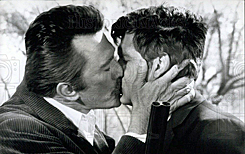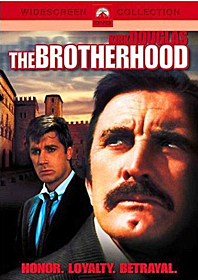Sat 30 Jul 2016
THE BROTHERHOOD. Paramount Pictures, 1968. Kirk Douglas, Alex Cord, Irene Papas, Luther Adler, Susan Strasberg, Murray Hamilton, Eduardo Ciannelli. Music: Lalo Schifrin. Producer: Kirk Douglas. Director: Martin Ritt.
I don’t know where this movie fits precisely into the chronology of Mafia-based crime films, but while there were certainly gangster movies before The Brotherhood was filmed, in terms of realism, none were quite like this one. It was also four years before The Godfather showed up and finally convinced everyone how they were supposed to be done.
The story has it that when this one bombed so badly at the box office, it took quite a while to convince the people at Paramount to do another one, which of course was The Godfather.
The reason I bring this up is that, well, first of all, the movie is actually quite good, but if you can’t place it properly in the evolution of Mafia movies, it can be viewed as a whole series of clichés. Kirk Douglas plays Frank Ginetta, an old-fashioned Mafia don based in New York City; Alex Cord is his (much) younger Vince, who’s gone to college, is home from Viet Nam, has just gotten married, and wants to join the “firm.” Big brother Frank is elated.

But Vince and the other members of the council want to abandon the old ways and start finding new ways to invest their money and talents. This causes all kinds of problems, as you can imagine. Frank also finds out who provided the tip-off that happened many years ago that resulted in the massacre of over 40 members of the Mafia at the time, including Frank’s father.
Frank does not take this very well, and his actions leave Vince squarely in the middle. Kirk Douglas takes this role and makes it entirely his own. He is an ebullient lover of his family, good food and happy times, and yet he casually and reminiscently tells someone about the first hit he ever made — when he was eighteen years old.

Alex Cord, in contrast, and perhaps deliberately so, downplays his role so low that you barely know he’s in the film. He’s grim and dour while his brother’s innate nature is cheerful and charming. The ending is perhaps inevitable, but the getting there is not only absorbing, but a lot of fun to watch.
If the movie didn’t do well financially, perhaps the movie audiences of the day were simply not ready for it. Another possibility, of course, is that I’m the only one in the world who has ever enjoyed it, but I’m fairly sure that that’s not so.

July 30th, 2016 at 3:08 pm
Alex Cord, of course, would go onto a starring role in AIRWOLF with Jan-Michael Vincent and Ernest Borgnine, two other actors highly prolific in the 1970s
July 30th, 2016 at 3:52 pm
Steve, you’re missing a couple of words in the last paragraph.
Don’t sell yourself short, you may really be the only person who liked the film. I’d never heard of it. I have an infinite capacity for enjoying sheer rubbish myself and that never stops me.
July 30th, 2016 at 3:56 pm
Two words were accidentally smooshed into one. I think it’s fixed now.
July 30th, 2016 at 3:58 pm
The following year Alex Cord was top billed in Stiletto opposite Barbara McNair and Patrick O’Neill. And while not quite as pretentious or as big a bore, my opinion, as this one, no one went either.
July 30th, 2016 at 5:47 pm
I actually agree this is a good movie that was timed wrong. Obviously it isn’t THE GODFATHER, but it doesn’t try to be. Douglas dominates the film and the ending is predictable, but like you I enjoy this one.
Have to agree with Barry on STILETTO though, a film that makes you feel a Harold Robbins novel was ill served.
July 30th, 2016 at 6:27 pm
Patrick O’Neal — He was a friend of mine and quite a guy, but I still managed to misspell his name.
July 30th, 2016 at 7:03 pm
This was ok I thought. Only Kirk Douglas and Irene Pappas brought life to the film.
Alex Cord was an energy black hole. Cord most often was.
July 31st, 2016 at 5:55 am
What Rick said. Now that you mention this, I do remember seeing it at the time, but it is almost as much a black hole in my memory as Alex Cord was as an actor.
It was no GODFATHER.
February 14th, 2020 at 11:40 pm
Paramount was high on the film while it was in production. they even scouted around for a suitable follow-up and found THE GODFATHER in galley form so they got it relatively cheap. The studio still held off until they saw the book sales. The teaser poster promised us that the Douglas of Champion, Paths of Glory and Lonely Are the Brave has returned. I recall it as just OK, looking as if it was made on sets normally used by Mission: Impossible.
May 27th, 2022 at 8:11 am
[…] to be the move that made Paramount so reluctant to greenlight “The Godfather” some years later, “The Brotherhood” may have been a flop at […]
May 28th, 2022 at 7:14 am
[…] to be the move that made Paramount so reluctant to greenlight "The Godfather" some years later, "The Brotherhood" may have been a flop at the […]